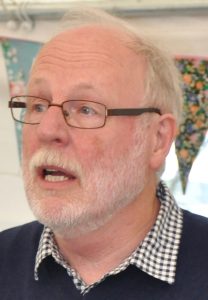 Ed Warren is a retired GP trainer in Barnsley
Ed Warren is a retired GP trainer in Barnsley
Levelling up is once again the flavour of the month. From its original announcement in 2014,1 it has taken nearly eight years for a detailed plan to be published.2,3 Michael Gove has been appointed to lead, so the government must be taking it seriously.
Levelling up is a big deal for Barnsley, the 38th (out of 316) most deprived local authority in England (and getting worse).4 So, levelling up is also a big deal for the Barnsley general practice community, as deprivation5 is a major driver of disease prevalence and healthcare needs. Conditions as disparate as learning disability, lung disease, obesity, diabetes, epilepsy, and peripheral vascular disease are all appreciably more common in deprived communities.6 Unsurprisingly, deprivation has a particular impact on the prevalence of severe mental illness, being associated with an increase of 57% compared with least deprived areas.6 To address this general practice in the most deprived areas gets (weighted for need) 7% less money per patient and struggles with 10% more patients on the list.7
There are reasons to speculate that a different and so far unidentified model of consulting may be more applicable to a northern clientele.
Money is clearly important. But perhaps there are other things going on which may be contributing to the effectiveness of primary care in deprived areas. Could it be that the established consultation models that GPs use and that the RCGP encourages trainees to use, are not entirely appropriate? Three big-hitters – The Consultation (Pendleton et al), The inner consultation (Neighbour’s oeuvre), The Cambridge-Calgary model – were all written by people working in the south of England. Perhaps patients in the north need a different type of consultation. Perhaps they think differently. Consultation aims may be the same, but how should they be achieved?
There are reasons to speculate that a different and so far unidentified model of consulting may be more applicable to a northern clientele. In the north the range of needs is different. Relations with establishment figures – such as GPs – will be different. Social barriers between GPs and their patients are likely to be greater.
They talk differently round here, and it is not just the accent. The use of language may also indicate a difference in attitudes and priorities. In 2004, Doncaster West PCT (remember those?) produced a local glossary,8 in which there were 14 different words for male genitals. What prevents the good folk of South Yorkshire saying ‘penis’?
Deprivation is not just about a lack of money: it has other effects. It limits choices both in life and for accessing healthcare. The economic impact of prescription costs or of taking time off to access investigations and treatment is relatively greater. Deprivation reduces self-confidence and assertiveness. Back in the day I felt that consultations with retired coalminers who got a decent ‘pit-pension’ were always slightly different. They would invariably be very clear in their requirements and would be politely intolerant of the waffle and obfuscation which seemed to work with others. A decent income generates pride in a life well-lived.
Disability rates are higher, so that economic inactivity for health reasons is not unusual.
In the north, the health environment is different. All the neighbours have their illnesses, are on tablets, and/or are waiting for an operation. Disability rates are higher, so that economic inactivity for health reasons is not unusual. Waits to see a GP are longer, waits for secondary care treatment are longer. This alters expectations, it shifts what is understood as normal. There is no point moaning because everyone is in the same boat.
Employment expectations and experiences are different. As medical students we were taken down a coalmine, and to visit a steelworks, on the reasonable assumption that we middle-class kids would otherwise have no idea of what it is like. Educational and training experiences are different. People in the north are more likely to rely on social support, so that their insight into statutory agencies will be more personal, immediate, and nuanced. Contacts with social services may be regarded as threatening rather than supportive. Deprived local authorities have suffered bigger cuts than more affluent ones.9
With all this in mind, it would not be surprising if the north-south divide also applied to the GP consultation. Is anybody out there thinking along the same lines? Feedback would be particularly welcome from GPs who have worked in the south but now work in the north (or vice-versa). Has your consulting toolbox needed amendment? Who is writing the Barnsley Consultation Model?
References
1. Osborne G. Chancellor: ‘We need a Northern powerhouse’. https://www.gov.uk/government/speeches/chancellor-we-need-a-northern-powerhouse [Accessed 14.2.22]
2. Gove M & Johnson B. Government unveils levelling up plan that will transform UK. https://www.gov.uk/government/news/government-unveils-levelling-up-plan-that-will-transform-uk [Accessed 14.2.22]
3. Blanchard J. Meet Boris Johnson’s new cabinet. Politico 25 July 2019. https://www.politico.eu/article/boris-johnson-new-cabinet-whos-in/ [Accessed 14.2.22]
4. Anon. Indices of multiple deprivation: Barnsley. https://www.barnsley.gov.uk/media/15795/imd-2019-infographic.pdf [Accessed 14.2.22]
5. Marmot M, Allen J, Boyce T, Goldblatt P, Morrison J. For The Health Foundation. Health Equity in England: The Marmot Review 10 Years On. https://www.health.org.uk/publications/reports/the-marmot-review-10-years-on [Accessed 14.2.22]
6. Baker C. House of Commons Library. Health inequalities: Income deprivation and north/south divides. https://commonslibrary.parliament.uk/health-inequalities-income-deprivation-and-north-south-divides/ [Accessed 14.2.22]
7. Fisher R. for The Health Foundation. ‘Levelling-up’ general practice in England. https://www.health.org.uk/publications/long-reads/levelling-up-general-practice-in-england [Accessed 14.2.22]
8. Rodgers L for Doncaster West PCT (2004). Glossary of Yorkshire Medical Terms. https://www.pennine-gp-training.co.uk/res/yorkshire_slang_glossary.pdf [Accessed 19.2.22]
9. Anon. Local government funding in England. Institute for government. https://www.instituteforgovernment.org.uk/explainers/local-government-funding-england [Accessed 19.2.22]
Featured image by Jonny Gios on Unsplash






